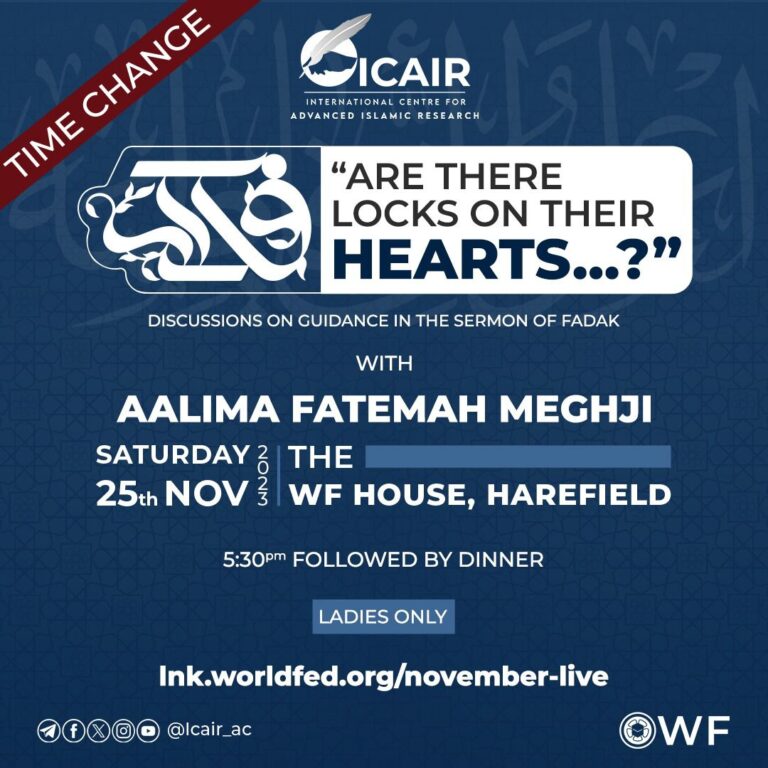
ICAIR’S First Ladies only Seminar ‘Are there locks on their hearts…’
DATE :
January 31, 2024
On Saturday 25th November 2023, the International Centre for Advanced Islamic Research (ICAIR) held a sisters-only seminar at WF House, Harefield, London. The seminar, which was attended by 60 sisters, focused on the theme of ‘guidance’ in the Sermon of Fadak, narrated by Sayyida Fatima (a), following the death of the Prophet.
The seminar was led by Aalima Fatemah Meghji, a graduate of the Islamic seminary. Aalima Meghji studied at Jamiat az-Zahra and completed the master’s program in Qur’anic Tafsir and Qur’anic Sciences with honours. She is currently an instructor at the Mizan Institute, leading the Sisters Department. Moreover, she has been teaching in a professional capacity for several years, previously serving as the Islamic Director at the Az-Zahraa Islamic Academy. Her current projects include a book on human evolution in the Shi’ite tradition, and her research interests include the principles of tafsir, Qur’anic hermeneutics, and women in the tradition.
The seminar opened with a historical contextualisation of the question posed by Sayyida Fatima (a) in the sermon: “Are there locks on their hearts?” Aalima Meghji related this question to Sayyida Fatima (a)’s reprimanding of the Muslims’ misguidance, owing to their abandonment of the Qur’an and the Prophet.
Having outlined the context of this question, the seminar participants were split into small groups, to discuss how Qur’anic verses approach the subject of locked hearts. Two themes emerged from these discussions: on the one hand, the Qur’an’s emphasis on how God seals the hearts of individuals and, on the other, the Qur’an’s emphasis on the impact of individual actions for the sealing of hearts. This discussion and its relevant verses relate more broadly to wider discussions on free will vs. predestination that Muslim theologians have debated for centuries.
To further analyse these two themes, Aalima Meghji introduced the two-tier categorisation of guidance stipulated in Ayatollah Jawad Amoli’s thematic tafsir of the Qur’an. Namely, an initial and general guidance, open to all, and a secondary guidance that is consequential to an individual’s actions. Following a detailed explanation of these two categories, Aalima Meghji closed the seminar by relating these categories back to the question of locked hearts, emphasising how guidance is accessible to all, whilst locked hearts are the consequences of our actions.
This seminar was held in line with ICAIR’s mission to empower the community through access to scholarship on Shi’i Islam.
The seminar was led by Aalima Fatemah Meghji, a graduate of the Islamic seminary. Aalima Meghji studied at Jamiat az-Zahra and completed the master’s program in Qur’anic Tafsir and Qur’anic Sciences with honours. She is currently an instructor at the Mizan Institute, leading the Sisters Department. Moreover, she has been teaching in a professional capacity for several years, previously serving as the Islamic Director at the Az-Zahraa Islamic Academy. Her current projects include a book on human evolution in the Shi’ite tradition, and her research interests include the principles of tafsir, Qur’anic hermeneutics, and women in the tradition.
The seminar opened with a historical contextualisation of the question posed by Sayyida Fatima (a) in the sermon: “Are there locks on their hearts?” Aalima Meghji related this question to Sayyida Fatima (a)’s reprimanding of the Muslims’ misguidance, owing to their abandonment of the Qur’an and the Prophet.
Having outlined the context of this question, the seminar participants were split into small groups, to discuss how Qur’anic verses approach the subject of locked hearts. Two themes emerged from these discussions: on the one hand, the Qur’an’s emphasis on how God seals the hearts of individuals and, on the other, the Qur’an’s emphasis on the impact of individual actions for the sealing of hearts. This discussion and its relevant verses relate more broadly to wider discussions on free will vs. predestination that Muslim theologians have debated for centuries.
To further analyse these two themes, Aalima Meghji introduced the two-tier categorisation of guidance stipulated in Ayatollah Jawad Amoli’s thematic tafsir of the Qur’an. Namely, an initial and general guidance, open to all, and a secondary guidance that is consequential to an individual’s actions. Following a detailed explanation of these two categories, Aalima Meghji closed the seminar by relating these categories back to the question of locked hearts, emphasising how guidance is accessible to all, whilst locked hearts are the consequences of our actions.
This seminar was held in line with ICAIR’s mission to empower the community through access to scholarship on Shi’i Islam.

